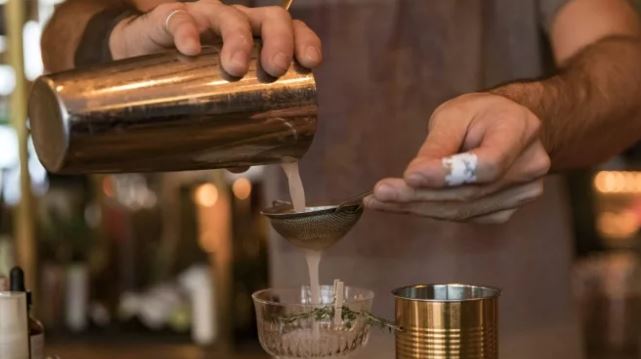Following the trend in Anglo-Saxon and Nordic countries, French gastronomy is put to the test with abstinence from alcohol, a fashion that initially originated after the Christmas holidays, but has been gaining ground.
The trend is known as “nolo”, that is to say without alcohol (“no alcohol”) or little alcohol (“low”).
For example, non-alcoholic rosé champagne, served in a luxury lingerie store in Paris, or “virgin” cocktails made expressly for the presentation of new restaurants or hotels.
Initially it was associated with what is known in English as “dry January” (“Dry January”), but cocktail bars first, and then prestigious restaurants have been extending the phenomenon throughout the year.
Hélène Pietrini, director of the gastronomic classification La Liste, assures that she “adores” these non-alcoholic menus, which represent “a way of tasting that comes from abroad” and that “completely changes the aromatic profile of the dishes and multiplies the ways of expressing themselves “.
In French haute cuisine, the chef with the most stars in the world, Anne-Sophie Pic, and her sommelier, the Argentinean Paz Levinson, were the pioneers of “nolo”.
“When I was pregnant, it was distressing to go to the restaurant and drink water throughout the meal. I wanted to create something exceptional” for all the customers, Paz Levinson confided to AFP.
“Today everyone is imitating him,” says Anne-Sophie Pic.
In her restaurant with three Michelin stars in Valence (southeast), this cook proposes a warm infusion of coffee of Brazilian origin, served in a large glass of wine, to accompany a venison steak.
– “Go further” –
“It is a trend that is growing in France, following the example of the Anglo-Saxon countries, which have an advantage,” explains Yann Daniel, a mixologist with the Alchimiste group, one of the leaders of the movement, to AFP.
Over the fall, this bartender was crafting a range of light cocktails, using “spices, herbs, roots and teas” for the Australian Tribe hotel chain in Paris.
Daniel was a bartender for more than two decades in some of the main establishments in the capital, and he admits that at first he was “quite doubtful.”
“In the end you realize that with these cocktails, people enjoy them more, appreciate them and recommend them,” he explains.
Another Alchimiste mixologist, Matthias Giroud, published in October the book “No Low” (Gründ) with more than 60 cocktail recipes.
For his part, David Toutain, with two Michelin stars, begins his menus with an effervescent drink made from bergamot and buckwheat.
The lobster is served with an infusion of pine buds; to accompany the eel, apple juice with fennel vinegar, and beetroot and carrot nectar for the pigeon-based dish.
The challenge is one of size: propose specific drinks for each dish.
“I have been working for years to prepare it,” this chef told AFP, who since November has already been offering a double menu: non-alcoholic drinks or wines to pair with each dish.
“With this experience we go further,” he says. “A winery does not make a wine based on a dish, but the sommelier chooses it based on his palate. Here it is about my choice,” he emphasizes.
– The threatened wine?-
Faced with the “frustration” of customers, who came across non-alcoholic drinks from supermarkets on the menu, sommelier Benoît d’Onofrio was inspired by the classic techniques of alcoholic beverages, such as maceration or the extraction of aromas.
“In view of the reactions that I have received, I am sure that the nolo has many days ahead of him,” he says.
Another highly reputable chef, Guy Savoy, considers instead that this trend is legitimate in countries that do not produce wine, but not so much in France.
“We are in the first country in the world when it comes to excellent wines. I don’t judge it, but I don’t adhere either” to fashion, he explains.
The German food critic Jörg Zipprick, co-founder of Liste, believes that behind the “nolo” trend there is a certain puritanical air, of fighting against “devilish alcohol”.
“We love wine, champagne, and we claim it. The only thing we are proposing is a different way of doing things” replied David Toutain.

